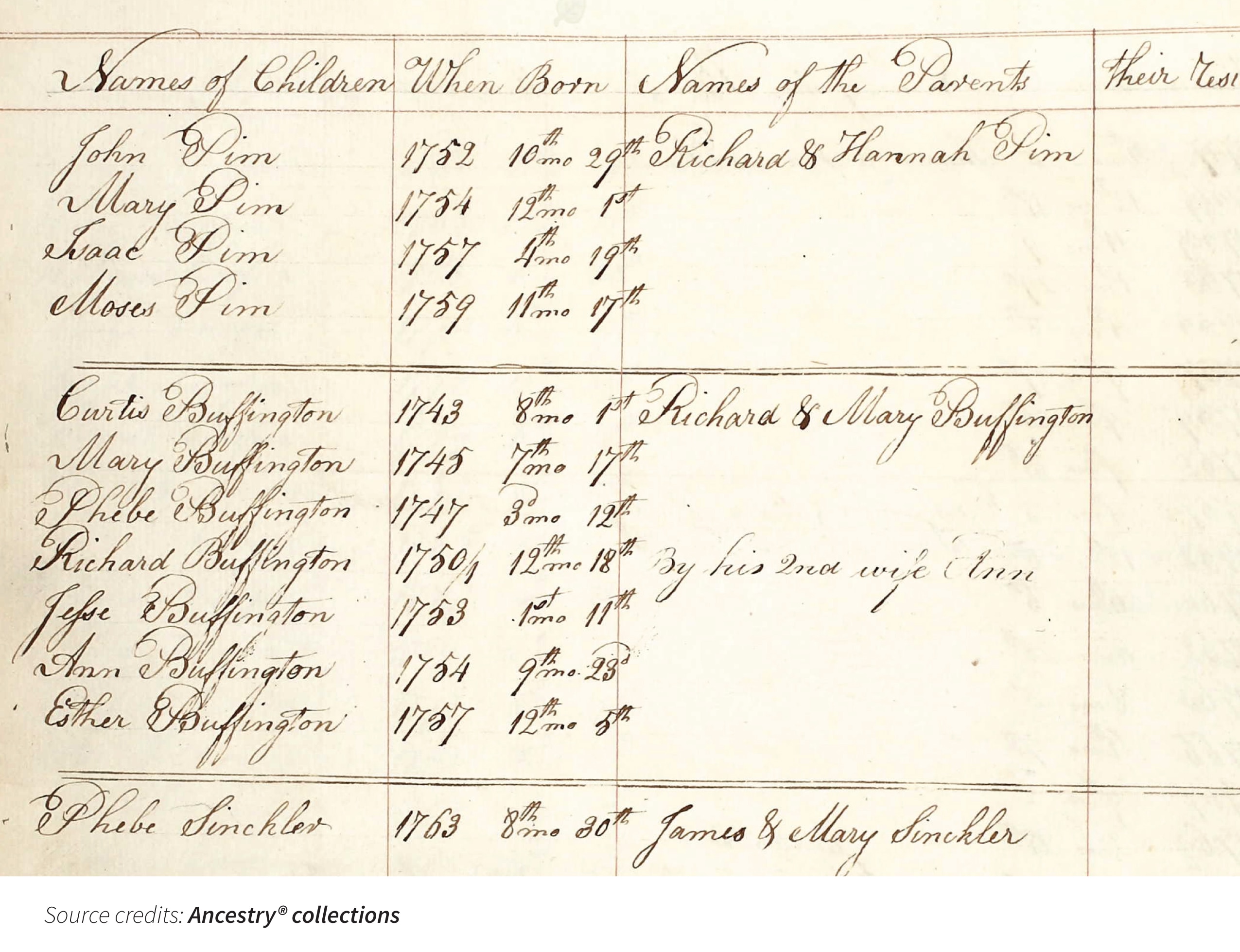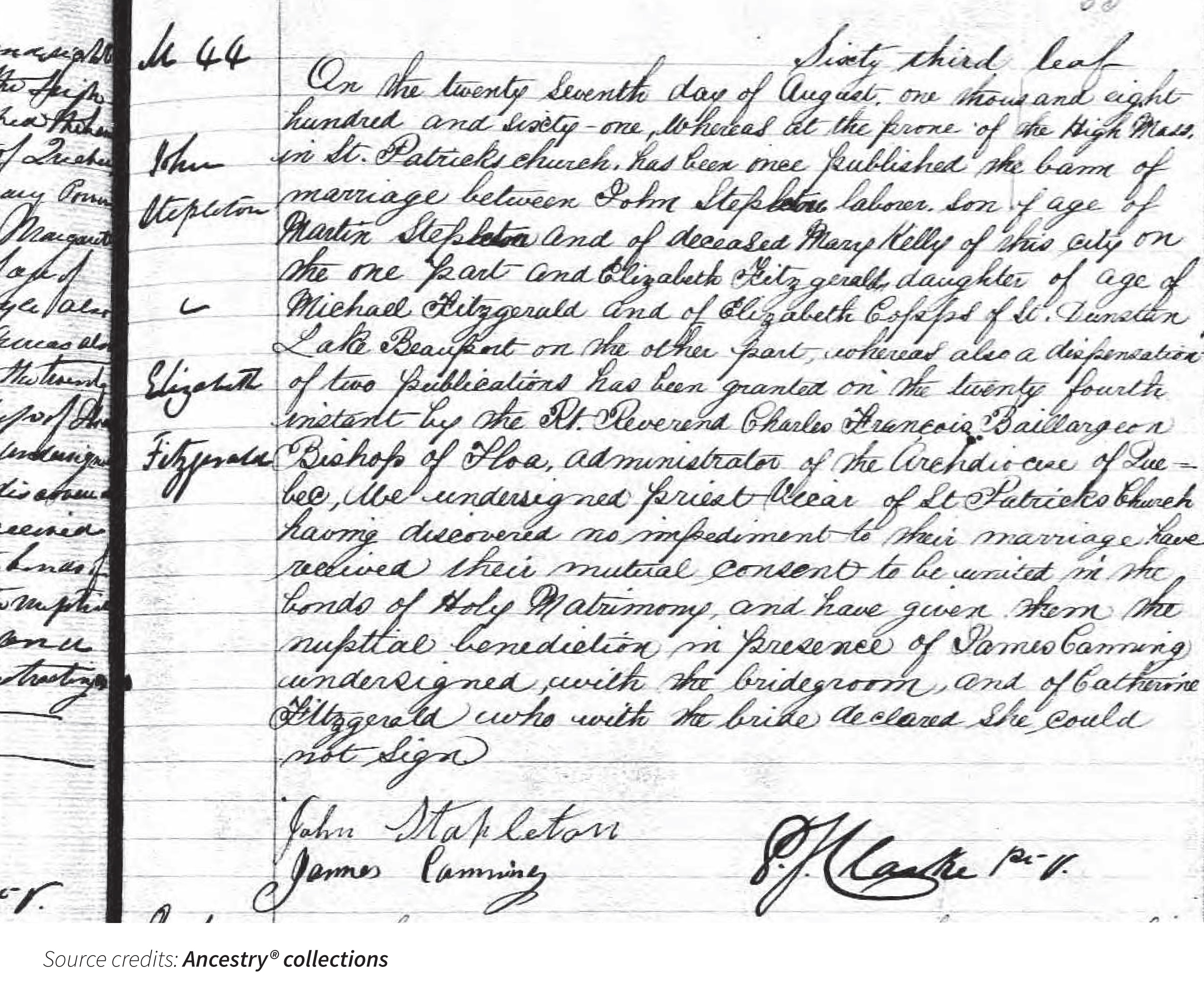Ancestry® Family History
Church Records
Church records can be a potential treasure trove for family historians. Not only might they contain vital records about your ancestors—birth, marriage, and death records—but since they often pre-date civil or government records, they may be a tremendous help when you’re researching earlier generations. For example, you might find a 19th-century Catholic marriage record for someone who lived in Mexico or Ireland before emigrating to the United States. Or you could find an 18th-century death record for a Presbyterian ancestor in Pennsylvania.
And because places of worship have traditionally been more than a place to practice faith—it’s been the center of a community—you might discover unexpected, interesting, and important information in church or parish records that provide new insights into your family’s story. For instance, notes in 17th-century monthly meeting records might describe when your Quaker relatives moved from one location to another in British North America.

What Are Church Records?
Church or parish records vary by time and place, but they generally include information about births, baptisms, marriages, deaths, and burials. In past centuries, churches played the role that local governments do today and kept records about local residents. Yet unlike civil servants, the priests and deacons who made the records usually knew the members of the congregation personally. This made them more likely to spell someone's name correctly and get the facts right. These church or parish records can also be more thorough and accurate than later civil records because some contain additional information.
The broad category of church records also includes histories, member and clergy lists, meeting notes, and much more. For example, on Ancestry® you might find everything from a list of 19th-century ministers in New Zealand to Catholic school records in Ireland.
Church records are usually organized by denomination and are available for churches around the world. Ancestry® has an extensive collection of records for these denominations:
- Lutheran Church
- Roman Catholic Church
- Quakers (or Society of Friends)
- Church of England (also known as the Anglican or Episcopal Church)
There are also other faith traditions represented in the Ancestry® catalog , like Southern Baptist, Dutch Reformed, United Methodist, and Congregational. However, be aware that some religious communities may not have licensed their collections to Ancestry®, which is why you won’t find them in the card catalog.

What Biographical Information Can Church Records Provide?
Church records can provide a wealth of information about your family. Beyond vital records (like birth, marriage, and death), they may track religious events like baptism and confirmation as well. Here’s the type of information these records may cover.
- Baptism records typically include a person's birth date, baptism date, church, and the names of the mother and father. Some may also list the names of godparents or sponsors. Those roles are often filled by close relatives or community members, so you may want to explore their connection to your family. You might discover a new sibling under a married name or even a grandparent.
- Marriage records usually include the wedding date, the town and church where it took place, and the names of both spouses. Sometimes they list parents' names, too, and even the location of the parents if they aren’t present or local. Remember that marriages traditionally took place at the bride's family's church, so knowing its name could help you find more information about a maternal line.
- Confirmation records are mostly available for Catholic and Anglican/Episcopal churches. Information can be scant—often just a person's name, sex, and church—but they may offer helpful clues. Confirmation generally occurs around age 13, so that can give you a sense of your ancestor's age and where they were living as a teenager.
- Death records contain at least a person's name and the date and place of death. They may also include a birth date, the names of parents or a spouse, church name, and the name of the funeral home. Often churches maintained separate records for where someone was buried.
Clues About Culture and Heritage in Church Records
Church records may suggest your ancestors’ origins. Historically, denominations were associated with certain nationalities, so finding out what church your ancestors attended can shed light on where they came from. For instance, if your relatives were members of a Lutheran Church, there's a good chance they (or earlier generations) were from Germany or Scandinavia. A Methodist ancestor in the late 1700s and early 1800s likely came to the United States from Ireland, while someone in the Dutch Reformed Church in New York probably had roots in the Netherlands.
Churches as Community Hubs for Early Settlers and Immigrants
Sometimes church records are the earliest evidence of an ethnic or religious community's presence in a certain location. Some of the earliest immigrants to the United States were escaping religious persecution in Europe: the Puritans, who were dissenters from the Church of England, and William Penn, who founded Pennsylvania as a refuge for Quakers. When these religious refugees arrived, they typically started or joined a church.
Those who arrived in the 19th century, like Catholic immigrants from Ireland or Italy, likely found comfort and support in their local church because of shared faith traditions. These churches often helped new immigrants find jobs and obtain education.

Additional Historical Insights from Church Records
Your ancestors' religious affiliations can also help you place them in historical context. If you had any Protestant relatives living in New York or New England in the early 19th century, for example, perhaps they took part in the religious revival known as Second Great Awakening. A time of fiery preachers, moral reforms, and door-to-door evangelism, it led to the growth of many Protestant denominations in the U.S., especially the Baptist and Methodist Churches.
Some churches have particularly rich histories that can provide additional clues about your ancestors' lives. If your ancestors were African American and Methodist, maybe they helped form the African Methodist Episcopal Church, the first organized African American denomination in the United States, founded in 1816. (Its name derives from the fact that Methodism grew out of the Episcopal Church.)
Or maybe your ancestors belonged to a church that was active in the Underground Railroad or Civil Rights movement, such as Plymouth Church in New York City, which helped enslaved people seek freedom, or the Ebenezer Baptist Church in Atlanta, where Martin Luther King, Jr., preached.
How Can You Learn About Your Religious Ancestors on Ancestry®?
Ancestry has millions of church records from around the world. Using the filters in the online card catalog, you can narrow your search to a specific religion, region, or time period. (Note that some records may only be available in other languages, like French, Spanish, German, or Latin.) Here’s a sampling of what you may find.
Pennsylvania and New Jersey Church and Town Records go as far back as 1669 and include histories and newspaper clippings as well as material from cemeteries and funeral homes. They have records from multiple denominations but are particularly extensive for the Methodist Church.
Catholic Parish Registers from Ireland date from 1655 to 1915 and cover most of the population. Eighty-nine percent of Irish people were Catholic in the late 19th century, so you're likely to find vital records for Irish ancestors in this vast archive. Catholic records are also available for many other countries—Mexico, Germany, Austria, Hungary, for example.
Presbyterian Church Records contain vital records from congregations in the United States from 1701 to 1970. They also include membership records, which can have information about when your ancestor joined the church.
Explore personal accounts. Some information may not appear in formal church registers, but in private notebooks. The Journal of Silas Constant, a Presbyterian minister in New York, includes records from 1784 to 1825. It also includes details on prominent families connected to the parish.
Check membership rolls and directories. Sometimes churches kept a list of everyone who belonged to the parish, such as in the Dutch Reformed Church membership records, which span 1701 to 1995. These usually note the name of a husband and wife, and the date and place of membership. This can help you place where your ancestors lived in a given year. Other membership records are more extensive. The Quaker Meeting Records for Canada covers meeting minutes, disciplinary proceedings, and marriage, birth, and death records.
Browse church histories. These can reveal interesting details about your ancestors’ community. They might include biographical information about long-standing members or lists of charities the church was involved in. Some are amazingly thorough, like the History of the First United Methodist Church of Ozark, Alabama, which covers 100 years, describes the hardships of the Depression, and highlights the church softball league.
Explore Your Family History Through Church Records
With their long history and detailed information, church records can be invaluable to your genealogy research. You may discover new family members, fascinating stories about your ancestors’ community, and more. Learn about your family's religious and community history through the church records on Ancestry® today.
References
"A 'Short' History of the First Church in Salem." The First Church in Salem. Accessed October 21, 2022. https://www.firstchurchinsalem.org/the-long-history.
"African Methodist Episcopal Church." Encyclopædia Britannica. Accessed October 20, 2022. https://www.britannica.com/topic/African-Methodist-Episcopal-Church.
"American Catholic History Classroom: The Immigrant Church." The Catholic University of America. Accessed October 21, 2022. https://cuomeka.wrlc.org/exhibits/show/catholic-people/people-background/the-immigrant-church.
"Confirmation." Encyclopædia Britannica. Accessed October 20, 2022. https://www.britannica.com/topic/confirmation.
"Ebenezer Baptist Church." National Parks Service. U.S. Department of the Interior. Accessed October 20, 2022. https://www.nps.gov/malu/planyourvisit/ebenezer_baptist_church.htm.
"Genealogy: Other Areas Church Records." UMass Amherst Libraries. Accessed October 20, 2022. https://guides.library.umass.edu/c.php?g=672399&p=4737804.
Granquist, Mark A. "Lutherans in America." Oxford Research Encyclopedia of American History, August 31, 2016. https://doi.org/10.1093/acrefore/9780199329175.013.381.
"Methodism: America." Encyclopædia Britannica. Accessed October 20, 2022. https://www.britannica.com/topic/Methodism/America.
"Methodists, Methodism." The Episcopal Church. Accessed October 20, 2022. https://www.episcopalchurch.org/glossary/methodists-methodism/.
"Our History." Plymouth Church. Accessed October 20, 2022. http://www.plymouthchurch.org/history.
"Religion and the Founding of the American Republic." Library of Congress. Accessed October 20, 2022. https://www.loc.gov/exhibits/religion/rel01.html.
"The Seven Sacraments of the Roman Catholic Church." Encyclopædia Britannica. Accessed October 20, 2022. https://www.britannica.com/list/the-seven-sacraments-of-the-roman-catholic-church.
"William Penn." Encyclopædia Britannica. Accessed October 21, 2022. https://www.britannica.com/biography/William-Penn-English-Quaker-leader-and-colonist.
Image credits:
St James' Church and graveyard, Avebury. istockphoto, https://www.istockphoto.com/photo/st-james-church-and-graveyard-avebury-gm1163402752-319440590.
Ancestry.com:
https://www.ancestry.com/imageviewer/collections/10896/images/dvm_LocHist000621-00054-0
https://www.ancestry.com/imageviewer/collections/62086/images/62085_302022005560_3802-00661
https://www.ancestry.com/imageviewer/collections/1091/images/d13p_1658A1024
https://www.ancestry.com/imageviewer/collections/2189/images/31905_1220706242_0083-00023